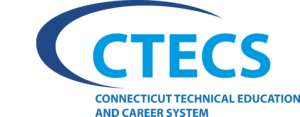English/Language Arts English/Language Arts Course Sequence
| Grade 9 | Grade 10 | Grade 11 | Grade 12 |
|---|---|---|---|
| 1 credit | 1 credit | 1 credit | 1 credit |
| English 9 or Honors English 9 |
English 10 or Honors English 10 |
English 11 or Honors English 11 |
Senior Seminar Honors Senior Seminar Introduction to Academic Writing – UCONN Seminar and Studio and Multimodal Composition – UCONN AP English Language and Composition AP English Literature and Composition Community College 3 Credit English Course |
The vision for literacy in the Connecticut Technical Education and Career System is to cultivate literate and productive students who are college, career and life ready. The mission at CTECS is to develop relevant, lifelong reading and writing habits in our students that will enhance their learning pathway and prepare them for success in a global community. The English/Language Arts program in Grades 9-12 supports the Vision of the Graduate and promotes critical thinking, reading, writing, listening, speaking, viewing and researching skills that students use to analyze, evaluate and synthesize text. The curriculum actively engages students in reading and reflecting on a wide range of texts with opportunities to develop thinking and writing skills.
Through student-centered whole class, small group, and independent reading and reflection, students in high school English/Language Arts classes develop an understanding of language and its use to convey meaning and provide insight about the world around them. Literacy is a complex skill that must be explicitly taught and actively practiced across all disciplines, both academic and trade. The CTECS English/Language Arts Curriculum supports the development of skills recommended by the CT Core ELA Standards, 21st Century Learning Standards and Career Technical Education (CTE) Career Ready Practices.
Course selections are customized per location.
Courses that are NCAA approved are indicated.
Courses that may be repeated for credit are indicated.
For more information about our programs and course descriptions please view CTECS Program of Studies.
